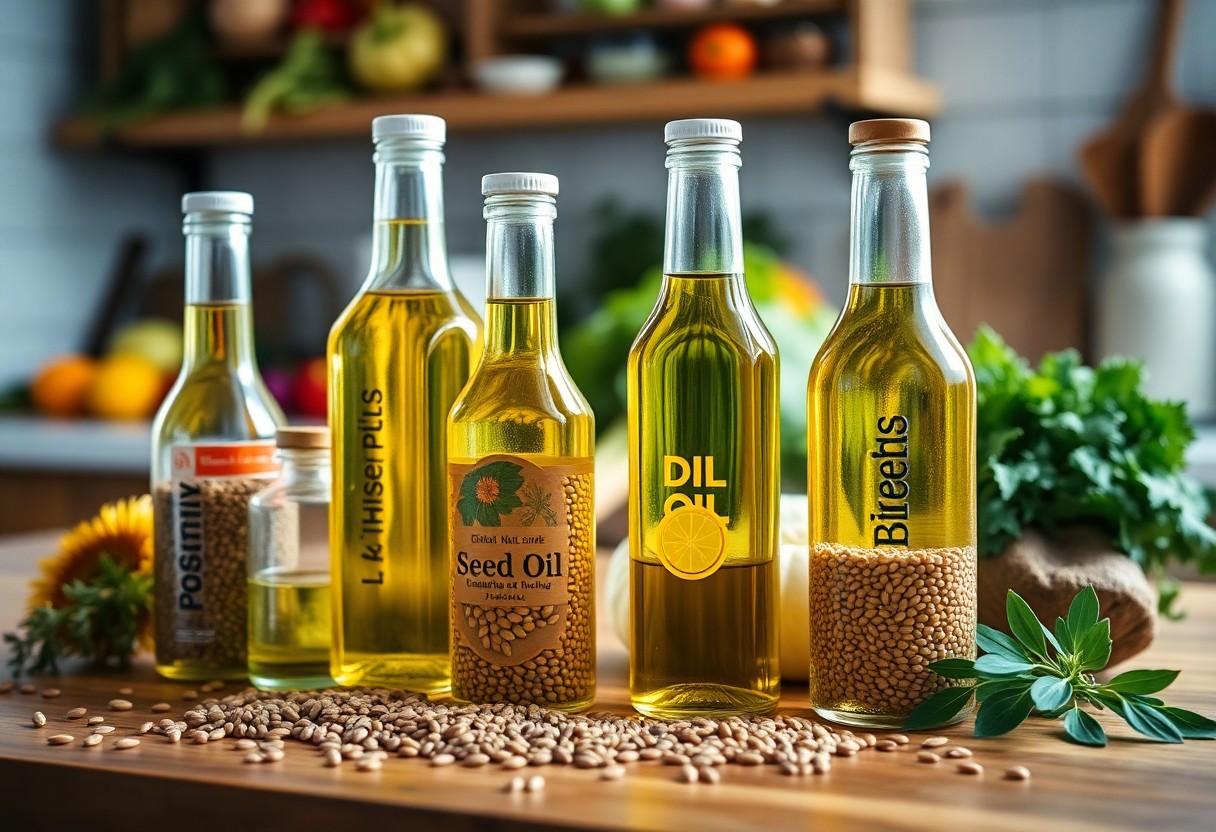Oils have become a hot topic in discussions about nutrition and your overall well-being. Many people wonder if seed oils, often used in cooking and processed foods, are harmful to your health. With various opinions and research suggesting both benefits and drawbacks, it’s vital to understand what these oils are and how they may impact your health. This post will explore the controversies surrounding seed oils and provide insights to help you make informed choices for your diet.

What Are Seed Oils?
As you explore the world of nutrition, you’ll encounter seed oils, which are often referred to as “industrial seed oils.” These vegetable oils are typically extracted using modern manufacturing processes, which raises questions about their overall impact on your health. While some influencers argue against their use, many experts, including those from Harvard and Stanford, emphasize that seed oils can be a beneficial part of your diet when compared to alternatives like butter or lard.
The Health Debate on Seed Oils
While seed oils often face criticism, the scientific community presents a more nuanced perspective. Some health experts argue that these oils, predominantly made from sunflower, soybean, and canola, are not as harmful as portrayed. Instead, they may contribute positively to your diet when used appropriately, challenging the narrative that paints them as outright dangerous.
Nutritional Perspectives
To understand seed oils better, it’s beneficial to consider the insights of nutrition specialists. Many, like Dr. Willett from Harvard, emphasize that these oils can be part of a healthy diet, especially when compared to alternatives like butter or lard. They provide imperative fatty acids that your body needs.
Omega-6 Fatty Acids Explained
Health experts highlight the importance of omega-6 fatty acids in your diet, contradicting the notion they are harmful. You need them for various bodily functions, and emerging studies show no significant link between increased consumption and chronic diseases.
The debate surrounding omega-6 fatty acids often focuses on their purported inflammatory effects. However, the consensus among researchers is changing. Despite concerns that high omega-6 intake may lead to inflammation, studies, including one involving over 110,000 participants, indicate no direct correlation with serious health risks. Instead, omega-6 fats are imperative for your health and may even provide benefits when consumed in balanced proportions with omega-3 fatty acids.
The Processing of Seed Oils
Assuming you’re concerned about the quality of what you consume, it’s important to understand how seed oils are processed. Most seed oils are produced using modern technology that can involve chemical solvents, such as hexane, during extraction. Although manufacturers work to eliminate harmful residues, trace amounts may persist. Some experts, like Dr. Christopher Gardner, suggest that these levels are not significantly harmful. Despite the processing methods, many studies indicate that seed oils remain a healthy fat option when consumed in moderation, especially compared to alternatives like butter or lard, which may have different health implications.

Ultra-Processed Foods vs. Seed Oils
It’s important to understand that while seed oil consumption has risen, this increase often parallels the prevalence of ultra-processed foods, which are high in sodium, added sugars, and unhealthy fats. Studies suggest that the health issues you may associate with seed oils might be more linked to these ultra-processed foods rather than the oils themselves. By focusing on whole, minimally processed foods, you can better support your health and mitigate potential risks associated with unhealthy eating patterns.
Balancing Omega-6 and Omega-3 Intake
Any discussion about seed oils often highlights the balance between omega-6 and omega-3 fatty acids in your diet. While omega-6s are vital for your health, consuming them in moderation is important. Research has shown that the ratio of these fats doesn’t substantially impact your well-being, as many studies indicate no direct link between increased omega-6 intake and illness. Ensuring you also include omega-3 sources, such as fatty fish, can support your health by providing anti-inflammatory benefits. Focus on a varied diet to maintain this balance effectively.
Practical Tips for Healthy Fat Consumption
Not all fats are created equal, and making informed choices can significantly impact your health. To enhance your fat consumption, consider these tips:
- Opt for natural sources of fats, such as avocados, nuts, and olive oil.
- Limit intake of ultra-processed foods that often contain unhealthy seed oils.
- Focus on balancing omega-3 and omega-6 fatty acids by including fatty fish in your diet.
The right choices can promote your well-being while minimizing potential risks associated with certain oils.
Conclusion
Drawing together the evidence presented, the debate over seed oils and their impact on your health continues to be complex. While some claims suggest potential harms due to omega-6 fatty acids or processing methods, leading experts assert that when consumed in moderation, seed oils can be part of a balanced diet. It’s imperative to focus on overall dietary patterns and prioritize whole, minimally processed foods to support your long-term health. By staying informed, you can make choices that work best for your personal nutrition needs.
FAQ
Q: Are seed oils unhealthy?
A: The perception that seed oils are unhealthy is influenced by the debate surrounding omega-6 fatty acids. However, experts, including Dr. Walter Willett from Harvard, argue that seed oils can be a healthy part of your diet, especially when compared to saturated fats like butter or lard. The notion that omega-6s are harmful is misleading, as many studies show no connection between their intake and increased illness risk. To support your overall health, it is crucial to balance the intake of omega-6s with omega-3s, but that doesn’t mean avoiding seed oils altogether.
Q: What are the potential risks associated with seed oils?
A: While the processing of seed oils may leave trace chemicals, experts like Dr. Christopher Gardner indicate that these amounts are unlikely to cause harm. Concerns about omega-6 fatty acids being pro-inflammatory are largely unfounded, as many studies refute this claim. Instead, the real issue may stem from the consumption of ultra-processed foods which often contain seed oils and other unhealthy ingredients. Prioritizing whole foods over processed options can help mitigate risks and promote your health.
Q: How can I incorporate seed oils in a healthy way?
A: To incorporate seed oils healthily, focus on using them in moderation alongside a diet rich in whole, unprocessed foods. Opt for oils like olive or avocado for cooking, and pair your meals with sources of omega-3 fatty acids, such as fish or flaxseeds. This balanced approach can enhance your health while still enjoying the benefits of seed oils. Additionally, maintain a diverse diet to ensure you’re getting a variety of nutrients necessary for overall well-being.


